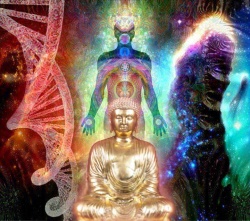Buddhism and the God-idea
Buddhism and the God-idea
by
Nyanaponika Thera
© 2004. BuddhaNet edition © 1996.
Quite contradictory views have been expressed in Western literature on the attitude of Buddhism toward the concept of God and gods. From a study of the discourses of the Buddha preserved in the Pali canon, it will be seen that the idea of a personal deity, a creator god conceived to be eternal and omnipotent, is incompatible with the Buddha's teachings. On the other hand, conceptions of an impersonal godhead of any description, such as world-soul, etc., are excluded by the Buddha's teachings on Anatta, non-self or unsubstantiality.
In Buddhist literature, the belief in a creator god (issara-nimmana-vada) is frequently mentioned and rejected, along with other causes wrongly adduced to explain the origin of the world; as, for instance, world-soul, time, nature, etc. God-belief, however, is placed in the same category as those morally destructive wrong views which deny the kammic results of action, assume a fortuitous origin of man and nature, or teach absolute determinism. These views are said to be altogether pernicious, having definite bad results due to their effect on ethical conduct.
Theism, however, is regarded as a kind of kamma-teaching in so far as it upholds the moral efficacy of actions. Hence a theist who leads a moral life may, like anyone else doing so, expect a favorable rebirth. He may possibly even be reborn in a heavenly world that resembles his own conception of it, though it will not be of eternal duration as he may have expected. If, however, fanaticism induces him to persecute those who do not share his beliefs, this will have grave consequences for his future destiny. For fanatical attitudes, intolerance, and violence against others create unwholesome kamma leading to moral degeneration and to an unhappy rebirth.
Although belief in God does not exclude a favorable rebirth, it is a variety of eternalism, a false affirmation of permanence rooted in the craving for existence, and as such an obstacle to final deliverance.
Among the fetters (samyojana) that bind to existence, theism is particularly subject to those of personality-belief, attachment to rites and rituals, and desire for fine-material existence or for a "heaven of the sense sphere," as the case may be.
As an attempt at explaining the universe, its origin, and man's situation in his world, the God-idea was found entirely unconvincing by the Buddhist thinkers of old. Through the centuries, Buddhist philosophers have formulated detailed arguments refuting the doctrine of a creator god. It should be of interest to compare these with the ways in which Western philosophers have refuted the theological proofs of the existence of God.
But for an earnest believer, the God-idea is more than a mere device for explaining external facts like the origin of the world. For him it is an object of faith that can bestow a strong feeling of certainty, not only as to God's existence "somewhere out there," but as to God's consoling presence and closeness to himself. This feeling of certainty requires close scrutiny. Such scrutiny will reveal that in most cases the God-idea is only the devotee's projection of his ideal — generally a noble one — and of his fervent wish and deeply felt need to believe. These projections are largely conditioned by external influences, such as childhood impressions, education, tradition and social environment. Charged with a strong emotional emphasis, brought to life by man's powerful capacity for image-formation, visualization and the creation of myth, they then come to be identified with the images and concepts of whatever religion the devotee follows. In the case of many of the most sincere believers, a searching analysis would show that their "God-experience" has no more specific content than this.
Yet the range and significance of God-belief and God-experience are not fully exhausted by the preceding remarks. The lives and writings of the mystics of all great religions bear witness to religious experiences of great intensity, in which considerable changes are effected in the quality of consciousness. Profound absorption in prayer or meditation can bring about a deepening and widening, a brightening and intensifying of consciousness, accompanied by a transporting feeling of rapture and bliss. The contrast between these states and normal conscious awareness is so great that the mystic believes his experience to be manifestations of the divine; and given the contrast, this assumption is quite understandable. Mystical experiences are also characterized by a marked reduction or temporary exclusion of the multiplicity of sense-perceptions and restless thoughts, and this relative unification of mind is then interpreted as a union or communion with the One God. All these deeply moving impressions and the first spontaneous interpretations the mystic subsequently identifies with his particular theology. It is interesting to note, however, that the attempts of most great Western mystics to relate their mystical experiences to the official dogmas of their respective churches often resulted in teachings which were often looked upon askance by the orthodox, if not considered downright heretical.
The psychological facts underlying those religious experiences are accepted by the Buddhist and well-known to him; but he carefully distinguishes the experiences themselves from the theological interpretations imposed upon them. After rising from deep meditative absorption (jhana), the Buddhist meditator is advised to view the physical and mental factors constituting his experience in the light of the three characteristics of all conditioned existence: impermanency, liability to suffering, and absence of an abiding ego or eternal substance. This is done primarily in order to utilize the meditative purity and strength of consciousness for the highest purpose: liberating insight. But this procedure also has a very important side-effect which concerns us here: the meditator will not be overwhelmed by any uncontrolled emotions and thoughts evoked by his singular experience, and will thus be able to avoid interpretations of that experience not warranted by the facts.
Hence a Buddhist meditator, while benefiting by the refinement of consciousness he has achieved, will be able to see these meditative experiences for what they are; and he will further know that they are without any abiding substance that could be attributed to a deity manifesting itself to the mind. Therefore, the Buddhist's conclusion must be that the highest mystic states do not provide evidence for the existence of a personal God or an impersonal godhead.
Buddhism has sometimes been called an atheistic teaching, either in an approving sense by freethinkers and rationalists, or in a derogatory sense by people of theistic persuasion. Only in one way can Buddhism be described as atheistic, namely, in so far as it denies the existence of an eternal, omnipotent God or godhead who is the creator and ordainer of the world. The word "atheism," however, like the word "godless," frequently carries a number of disparaging overtones or implications, which in no way apply to the Buddha's teaching.
Those who use the word "atheism" often associate it with a materialistic doctrine that knows nothing higher than this world of the senses and the slight happiness it can bestow. Buddhism is nothing of that sort. In this respect it agrees with the teachings of other religions, that true lasting happiness cannot be found in this world; nor, the Buddha adds, can it be found on any higher plane of existence, conceived as a heavenly or divine world, since all planes of existence are impermanent and thus incapable of giving lasting bliss. The spiritual values advocated by Buddhism are directed, not towards a new life in some higher world, but towards a state utterly transcending the world, namely, Nibbana. In making this statement, however, we must point out that Buddhist spiritual values do not draw an absolute separation between the beyond and the here and now. They have firm roots in the world itself for they aim at the highest realization in this present existence. Along with such spiritual aspirations, Buddhism encourages earnest endeavor to make this world a better place to live in.
The materialistic philosophy of annihilationism (ucchedavada) is emphatically rejected by the Buddha as a false doctrine. The doctrine of kamma is sufficient to prove that Buddhism does not teach annihilation after death. It accepts survival, not of an eternal soul, but of a mental process subject to renewed becoming; thus it teaches rebirth without transmigration. Again, the Buddha's teaching is not a nihilism that gives suffering humanity no better hope than a final cold nothingness. On the contrary, it is a teaching of salvation (niyyanika-dhamma) or deliverance (vimutti) which attributes to man the faculty to realize by his own efforts the highest goal, Nibbana, the ultimate cessation of suffering and the final eradication of greed, hatred and delusion. Nibbana is far from being the blank zero of annihilation; yet it also cannot be identified with any form of God-idea, as it is neither the origin nor the immanent ground or essence of the world.
Buddhism is not an enemy of religion as atheism is believed to be. Buddhism, indeed, is the enemy of none. A Buddhist will recognize and appreciate whatever ethical, spiritual and cultural values have been created by God-belief in its long and checkered history. We cannot, however, close our eyes to the fact that the God-concept has served too often as a cloak for man's will to power, and the reckless and cruel use of that power, thus adding considerably to the ample measure of misery in this world supposed to be an all-loving God's creation. For centuries free thought, free research and the expression of dissident views were obstructed and stifled in the name of service to God. And alas, these and other negative consequences are not yet entirely things of the past.
The word "atheism" also carries the innuendo of an attitude countenancing moral laxity, or a belief that man-made ethics, having no divine sanction, rest on shaky foundations. For Buddhism, however, the basic moral law is inherent in life itself. It is a special case of the law of cause and effect, needing neither a divine law-giver nor depending upon the fluctuating human conceptions of socially conditioned minor moralities and conventions. For an increasing section of humanity, the belief in God is breaking down rapidly, as well as the accustomed motivations for moral conduct. This shows the risk of basing moral postulates on divine commandments, when their alleged source rapidly loses credence and authority. There is a need for an autonomous foundation for ethics, one that has deeper roots than a social contract and is capable of protecting the security of the individual and of human institutions. Buddhism offers such a foundation for ethics.
Buddhism does not deny that there are in the universe planes of existence and levels of consciousness which in some ways may be superior to our terrestrial world and to average human consciousness. To deny this would indeed be provincial in this age of space travel. Bertrand Russell rightly says: "It is improbable that the universe contains nothing better than ourselves."
Yet, according to Buddhist teachings, such higher planes of existence, like our familiar world, are subject to the law of impermanence and change. The inhabitants of such worlds may well be, in different degrees, more powerful than human beings, happier and longer-lived. Whether we call those superior beings gods, deities, devas or angels is of little importance, since it is improbable that they call themselves by any of those names. They are inhabitants of this universe, fellow-wanderers in this round of existence; and though more powerful, they need not be wiser than man. Further, it need not be denied that such worlds and such beings may have their lord and ruler. In all probability they do. But like any human ruler, a divine ruler too might be inclined to misjudge his own status and power, until a greater one comes along and points out to him his error, as our texts report of the Buddha.
These, however, are largely matters beyond the range and concern of average human experience. They have been mentioned here chiefly for the purpose of defining the Buddhist position, and not to serve as a topic of speculation and argument. Such involvement can only divert attention and effort from what ought to be our principal object: the overcoming of greed, hatred and delusion where they are found in the here and now.
An ancient verse ascribed to the Buddha in the Questions of King Milinda says:
Not far from here do you need to look!
Highest existence — what can it avail?
Here in this present aggregate,
In your own body overcome the world!
Source
"Buddhism and the God-idea", by Nyanaponika Thera. Access to Insight (Legacy Edition), 10 November 2013, http://www.accesstoinsight.org/lib/authors/nyanaponika/godidea.html .
QUESTION: Do Buddhists believe in a god?
ANSWER: No, we do not. There are several reasons for this. The Buddha, like modern sociologists and psychologists, believed that religious ideas and especially the god idea have their origins in fear. The Buddha says:
Gripped by fear men go to sacred mountains, sacred groves, sacred trees and shrines.
Primitive man found himself in a dangerous and hostile world, the fear of wild animals, of not being able to find enough food, of injury or disease, and of natural phenomena like thunder, lightning and volcanoes was constantly with him. Finding no security, he created the idea of gods in order to give him comfort in good times, courage in times of danger and consolation when things went wrong. To this day, you will notice that people become more religious at times of crises, you will hear them say that the belief in a god or gods gives them the strength they need to deal with life. You will hear them explain that they believe in a particular god because they prayed in time of need and their prayer was answered. All this seems to support the Buddha’s teaching that the god-idea is a response to fear and frustration. The Buddha taught us to try to understand our fears, to lessen our desires and to calmly and courageously accept the things we cannot change. He replaced fear, not with irrational belief but with rational understanding.
The second reason the Buddha did not believe in a god is because there does not seem to be any evidence to support this idea. There are numerous religions, all claiming that they alone have god’s words preserved in their holy book, that they alone understand god’s nature, that their god exists and that the gods of other religions do not. Some claim that god is masculine, some that she is feminine and others that it is neuter. They are all satisfied that there is ample evidence to prove the existence of their god but they laugh in disbelief at the evidence other religions use to prove the existence of another god. It is not surprising that with so many different religions spending so many centuries trying to prove the existence of their gods that still no real, concrete, substantial or irrefutable evidence has been found. Buddhists suspend judgement until such evidence is forthcoming.
The third reason the Buddha did not believe in a god is that the belief is not necessary. Some claim that the belief in a god is necessary in order to explain the origin of the universe. But this is not so. Science has very convincingly explained how the universe came into being without having to introduce the god-idea. Some claim that belief in god is necessary to have a happy, meaningful life. Again we can see that this is not so. There are millions of atheists and free-thinkers, not to mention many Buddhists, who live useful, happy and meaningful lives without belief in a god. Some claim that belief in god’s power is necessary because humans, being weak, do not have the strength to help themselves. Once again, the evidence indicates the opposite. One often hears of people who have overcome great disabilities and handicaps, enormous odds and difficulties through their own inner resources, through their own efforts and without belief in a god. Some claim that god is necessary in order to give man salvation. But this argument only holds good if you accept the theological concept of salvation and Buddhists do not accept such a concept. Based on his own experience, the Buddha saw that each human being had the capacity to purify the mind, develop infinite love and compassion and perfect understanding. He shifted attention from the heavens to the heart and encouraged us to find solutions to our problems through self-understanding.
QUESTION: But if there are no gods how did the universe get here?
ANSWER: All religions have myths and stories which attempt to answer this question. In ancient times, when man simply did not know, such myths were adequate, but in the 20th century, in the age of physics, astronomy and geology, such myths have been superseded by scientific fact. Science has explained the origin of the universe without recourse to the god-idea.
QUESTION: What does the Buddha say about the origin of the universe?
ANSWER: It is interesting that the Buddha’s explanation of the origin of the universe corresponds very closely to the scientific view. In the Aganna Sutta, The Buddha describes the universe being destroyed and then re-evolving into its present form over a period of countless millions of years. The first life formed on the surface of the water and again, over countless millions of years, evolved from simple into complex organisms. All these processes are without beginning or end, and are set in motion by natural causes.
QUESTION: You say there is no evidence for the existence of a god. But what about miracles?
ANSWER: There are many who believe that miracles are proof of gods existence. We hear wild claims that a healing has taken place but we never get an independent testimony from a medical office or a surgeon. We hear second-hand reports that someone was miraculously saved from disaster but we never get an eye-witness account of what is supposed to have happened. We hear rumours that prayer straightened a diseased body or strengthened a withered limb, but we never see X-rays or get comments from doctors or nurses. Wild claims, second-hand reports and rumours are no substitute for solid evidence and solid evidence of miracles is very rare. However, sometimes unexplained things do happen, unexpected events do occur. But our inability to explain such things does not prove the existence of gods. It only proves that our knowledge is as yet incomplete. Before the development of modern medicine, when people didn’t know what caused sickness people believed that god or the gods sent diseases as a punishment. Now we know what causes such things and when we get sick, we take medicine. In time when our knowledge of the world is more complete, we will be able to understand what causes unexplained phenomena, just as we can now understand what causes disease.
QUESTION: But so many people believe in some form of god, it must be true.
ANSWER: Not so. There was a time when everyone believed that the world was flat, but they were all wrong. The number of people who believe in an idea is no measure of the truth or falsehood of that idea. The only way we can tell whether an idea is true or not is by looking at the facts and examining the evidence.
QUESTION: So if Buddhists don’t believe in gods, what do you believe in?
ANSWER: We don’t believe in a god because we believe in man. We believe that each human being is precious and important, that all have the potential to develop into a Buddha – a perfected human being. We believe that human beings can outgrow ignorance and irrationality and see things as they really are. We believe that hatred, anger, spite and jealousy can be replaced by love, patience, generosity and kindness. We believe that all this is within the grasp of each person if they make the effort, guided and supported by fellow Buddhists and inspired by the example of the Buddha. As the Buddha says:
No one saves us but ourselves,
No one can and no one may.
We ourselves must walk the path,
But Buddhas clearly show the way.








